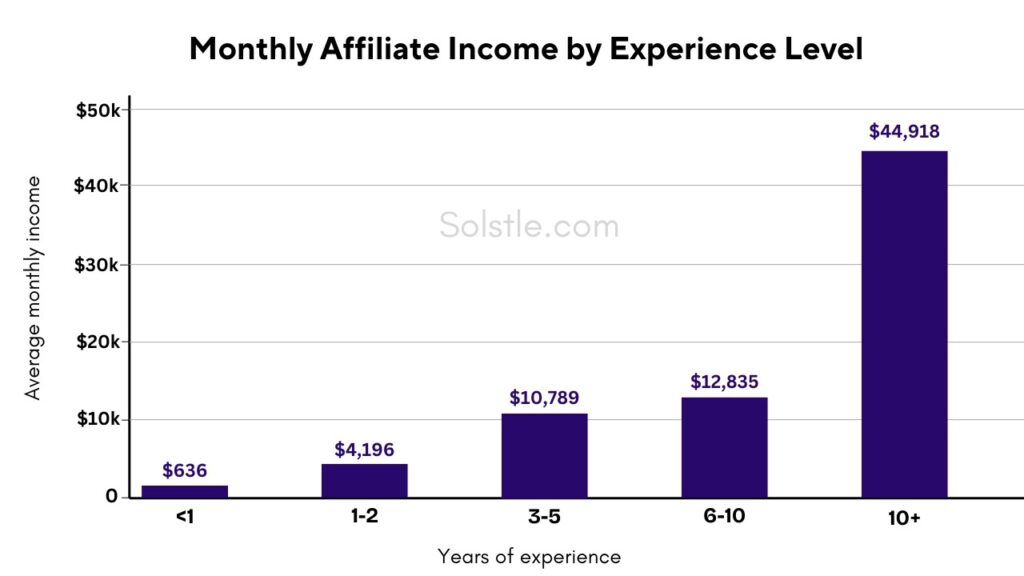“Why build your own empire from scratch when you can profit from empires already built?”
Imagine running an online business without creating products, handling inventory, or offering services. That’s the freedom of affiliate marketing
The U.S. affiliate marketing industry is set for strong growth, with spending projected to rise from ~$12 billion in 2025 to $20 billion by 2030, driven by e-commerce, influencer collaborations, and AI innovations. Retail (44% of revenue), SaaS, and finance lead adoption, with a robust 12:1 ROI. Despite challenges like ad fraud, consumer trust (88% influenced by influencer recommendations) and strategies like micro-influencer partnerships and mobile optimization ensure a positive outlook through 2030.
What is affiliate marketing?
Affiliate marketing is a business model where you promote other companies’ products and earn a commission for each sale or lead you generate. It’s performance-based, low-risk, and scalable, making it a smart revenue stream for digital entrepreneurs
Is Affiliate Marketing a Genuine Business Model?
Affiliate marketing is not a scam. It’s a legitimate way to earn income online.
It’s legal—as long as you follow the laws and regulations in your country, such as advertising standards and disclosure requirements.
It’s ethical—provided you’re transparent about your affiliate relationships and only recommend products or services you genuinely trust and believe in.Want the full picture? Check out: Is Affiliate Marketing Legit—and Is It Right for You?
What Makes Affiliate Marketing Worth Doing?
Let’s explore a few solid reasons to consider affiliate marketing
Minimal Investment, Maximum Safety
Launching a traditional business often demands heavy upfront costs—inventory, staff salaries, office space, and equipment.
Affiliate marketing flips the script.
All you truly need is a website, which you can launch for a relatively small investment. If things don’t pan out, you’ve only spent time and a modest budget. That makes it a safe, smart way to test the entrepreneurial waters without risking significant capital.
Earn While You Sleep
Unlike a typical 9-to-5 job, where your income is tied to your working hours, affiliate marketing offers the chance to build passive income streams.
Once your website gains traffic and visitors click on your affiliate links, you earn commissions—even while you’re sleeping, traveling, or spending time with family.
This ability to decouple your time from your earnings is a major attraction for entrepreneurs aiming for financial freedom.
Freedom to Work From Anywhere
Affiliate marketing gives you true location independence.
As long as you have an internet connection, your business goes wherever you go. Whether you’re working from your living room, a co-working space, or a café halfway around the world, you’re in control.
This geographical freedom perfectly fits the lifestyle of the modern digital entrepreneur.
Scalable and Diverse Income
Traditional sales roles often tie you to promoting a single brand. But as an affiliate marketer, you’re free to partner with multiple companies across different industries.
The result? More revenue streams and greater earning potential. The more relevant products and services you promote, the more opportunities you have to scale your income without limits.
Why Affiliate Marketing Will Keep Growing
Several trends are propelling affiliate marketing’s growth:
Booming e-commerce – Global online retail is projected to surpass $1 trillion by 2028.
Influencer marketing surge – Over 88% of consumers trust online recommendations, making affiliate partnerships highly effective.
Advancements in AI – Artificial intelligence is transforming how we create content, target audiences, and optimize campaigns, helping affiliates operate more efficiently.
High ROI – Affiliate marketing consistently delivers a solid return on investment—often around 12:1—making it attractive to brands and marketers alike.
In the U.S., affiliate marketing spending is forecasted to grow from approximately $12 billion in 2025 to $20 billion by 2030. Industries like retail (driving 44% of affiliate revenue), SaaS, and finance continue to expand their affiliate programs, ensuring strong opportunities for new and established marketers.
Entrepreneurs who start early can seize the advantage of this rising market, especially by focusing on mobile-friendly strategies and the rising influence of micro-influencers.
How does affiliate marketing work?
Step 1 – Join an Affiliate Program
Companies like Amazon, Walmart, or software providers like Canva and Shopify run affiliate programs.
- You sign up for their program.
- They approve you as an affiliate partner.
- They give you special tracking links tied to your account.
Step 2 – Get Your Unique Affiliate Links
Your tracking link might look something like this:
When someone clicks that link, the company knows you referred them.
Step 3 – Share and Promote
Here’s where the entrepreneur’s magic happens.
You share your affiliate links through:
- Blog articles
- YouTube videos
- Social media posts
- Newsletters
- Product review websites
Your job is to educate, inspire, or solve problems—not just push sales. That’s how you build trust and convert clicks into revenue.
Step 4 – Earn Commissions
When someone buys through your affiliate link, you earn a commission.
How much you earn varies:
- Physical products (Amazon): ~3–10% per sale
- Digital tools or software (like Canva, ConvertKit): 20%–50%, sometimes recurring
- Services (web hosting, insurance, travel booking): $50–$200+ per sale
How Cookies Play an Important Role in Affiliate Marketing
Here’s the secret weapon behind affiliate marketing: cookies.
When a visitor clicks your affiliate link, a small piece of data—called a cookie—is saved on their browser.
✅ This cookie tracks that you were the one who referred them.
Why this matters:
Imagine this scenario:
- A visitor clicks your affiliate link for a camera but doesn’t buy it right away.
- Three days later, they return to the website and decide to buy the camera.
→ Because the cookie is still active, you still get the commission.
Cookies can last anywhere from 24 hours to 90 days or even longer, depending on the program. Longer cookie durations give you a higher chance of earning commissions, even if customers delay their purchase.
This is how you can make money “while you sleep.” Your links and cookies keep working for you, even when you’re offline.
example 3 – Travel Blogging
Emma writes a blog about traveling on a budget. She recommends a booking website like Booking.com or Agoda.
She uses her affiliate link.
How Much Money Do Affiliate Marketers Make?
One of the most common questions I hear as an entrepreneur is:
“Can you actually make money with affiliate marketing—and how much?”
The answer is yes—but there’s a huge range in earnings depending on experience, niche, and effort.
Average Affiliate Income: The Data
According to Authority Hacker’s Affiliate Marketing Survey:
- The average affiliate marketer earns $8,038 per month.
But here’s the reality check:
- Affiliate marketers with less than 1 year of experience earn an average of only $636 per month.
This gap exists because affiliate marketing is not a get-rich-quick business. It takes time to learn:
✅ How to drive consistent traffic
✅ How to choose profitable products
✅ How to build trust with an audience
✅ How to optimize content for conversions
Why There’s Such a Big Range
Some affiliates earn nothing—or even lose money early on. Others make five, six, or even seven figures per month. It all depends on:
- Niche selection (finance, software, fitness, etc.)
- Traffic sources (SEO, social media, YouTube, email)
- Content quality and trust
- How many products they promote
- Whether they earn recurring commissions

How to become an affiliate marketer(Professional Entrepreneur’s Guide)
Affiliate marketing is more than side income — it’s a business model. Think of yourself as a digital entrepreneur who builds assets (content, audience, trust) that generate revenue.
Here’s how to start professionally:
Understand the Business Model
- Affiliate marketing = partnering with companies to promote their products.
- You earn a commission on every sale made through your unique referral link.
- It’s performance-based: you only earn when you produce results.
Entrepreneurs love it because:
✅ No inventory or shipping costs
✅ Flexible and scalable
✅ Works globally
2. Identify a Profitable Niche
Pick a focused market where:
- People spend money
- You can provide value or expertise
Examples:
- Health supplements for busy professionals
- Tech tools for freelancers
- Sustainable fashion for millennials
- Business software for small businesses
👉 Entrepreneur mindset: A niche isn’t just a topic — it’s a market segment with specific problems and desires.
Research Affiliate Programs
Find companies with:
- High-quality products
- Trustworthy reputation
- Attractive commission rates
- Marketing materials (banners, copy, etc.)
Platforms to explore:
- Amazon Associates
- ShareASale
- CJ Affiliate
- Impact
- Direct brand affiliate programs
4. Build Your Digital Presence
Treat your presence like a brand. Options:
- Website or blog → authority and SEO potential
- YouTube channel → reach and engagement
- Social media → fast growth, community building
- Email newsletter → long-term relationship and direct traffic
An entrepreneur sees their content as an asset that compounds in value over time.
5. Create High-Value Content
Your mission:
- Solve problems
- Educate
- Recommend solutions
Types of content that convert:
- Product reviews
- Tutorials
- Case studies
- Comparisons
- Industry insights
Professional Tip: Quality beats quantity. One excellent piece of content can earn income for years.
6. Integrate Affiliate Links
- Place links naturally within your content.
- Be transparent → include a disclosure statement.
“As an affiliate, I may earn a commission from qualifying purchases, at no extra cost to you.”
Transparency builds trust — the core of entrepreneurial success.
7. Drive Traffic Strategically
An entrepreneur doesn’t wait for luck. They engineer traffic via:
- SEO → free, long-term traffic
- Social media marketing
- Paid ads (if your numbers justify it)
- Email marketing
- Partnerships and collaborations
The goal → eyeballs on your content, and clicks on your links.
8. Measure, Analyze, Optimize
A professional marketer:
- Tracks clicks and sales
- Tests different headlines, CTAs, offers
- Drops what doesn’t work
- Scales what does
Entrepreneurship = constant optimization.
Income Potential
- Side income: $500 – $1,000/month
- Growing business: $2,000 – $10,000+/month
- Serious enterprise: $50,000 – $500,000+/month
Timeframe: typically 6-12 months to see consistent results if you treat it like a business.
Essential Entrepreneur Tools
- WordPress or Webflow → website
- Canva → create visuals
- Google Analytics → track data
- SEMrush / Ahrefs → keyword research
- Email software (ConvertKit, MailerLite)
Entrepreneur’s Mindset
Solve real problems
Focus on long-term brand building
Treat every piece of content as an asset
Keep learning and adapting
Your Next Step
Want to:
✅ Identify your niche?
✅ Find profitable programs?
✅ Draft your first content piece?
✅ Learn how to build a brand?
Let me know where you’d like to start — I’ll help you map out your entrepreneurial path into affiliate marketing!
GET A COMPLETE TO START AFFILAITE MARKETING
“Don’t wait—start earning! Download your affiliate marketing guide now.”

Leave a Reply